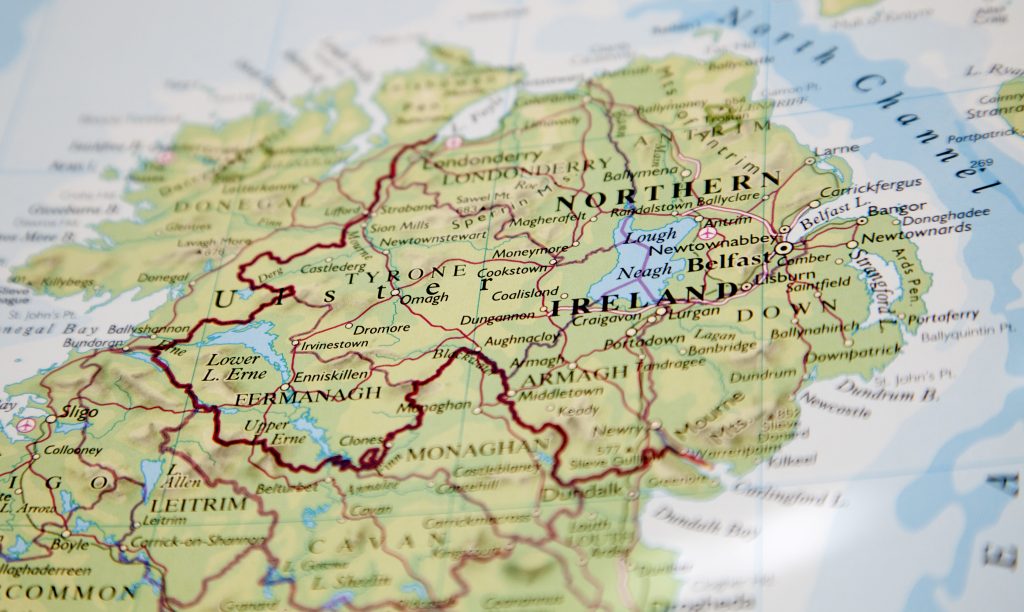Government opposes hard border between Ireland and Northern Ireland
A position paper published today (16th August) by the Government detailing its proposals on Northern Ireland and the Republic of Ireland has stressed the need to avoid a hard border, especially in relation to checks on agri-food products.

The Government has highlighted the “crucial importance of avoiding a return to a hard border for the peace process in Northern Ireland”, meaning avoiding any physical border infrastructure in either the United Kingdom or Ireland, including for customs or agri-food checks.
The paper repeated the Government’s desire to maintain the Common Travel Area and the rights of UK and Irish citizens, while upholding the 1998 Good Friday Agreement.
Recognising that the specific issues relating to customs and checks on particular goods, such as Sanitary and Phytosanitary (SPS) measures, will need to be prioritised, it proposed two “broad approaches” to a future customs relationship with the EU.
SPS measures were introduced to protect humans, animals and plants from diseases, pests or contaminants, and apply to all sanitary (relating to animals) and phytosanitary (relating to plants) measures that may have a direct or indirect impact on international trade.
A “highly streamlined” customs arrangement will aim to continue “some of the existing agreements between the UK and the EU”, put in place new “negotiated facilitations to reduce and remove barriers to trade” and implement technology-based solutions to make it easier to comply with customs procedures.
The paper states that a “new customs partnership” model would see customs approaches between the UK and the EU align in a way that removes the need for a UK-EU customs border.
One potential “unprecedented” approach, if the latter was to be considered, would involve the UK “mirroring the EU’s requirements for imports from the rest of the world where their final destination is the EU”.
In the case of a “highly streamlined” arrangement, this could include a continued waiver from the requirement to submit entry and exit summary declarations for goods moved between the UK and the EU, while maintaining the Common Transit Convention to help Northern Ireland and Irish companies transit goods.
In that case, the Government also intends to explore a “cross-border trade exemption” that would ensure that smaller traders could continue to operate as they do now.
On this note, it will also propose a new “trusted trader” arrangement for larger businesses on either side of the border that could, for example, allow for “simplified customs procedures”.
Agri-food products and EU citizenship
The paper highlights early on that the “extent and complexity of third country SPS and related checks” would not be “appropriate or consistent” with both the UK and EU’s intentions to avoid a hard border and to respect the Belfast Agreement.
It also points out that the EU has reached “deep agreements with near neighbours allowing for the flow of agri-food products across borders”, such as with Switzerland, which has a “common veterinary area with no border controls at the EU-Swiss border”.
With regard to checks on particular types of goods, including SPS measures for agri-food, the paper proposes an agreement on “regulatory equivalence for agri-food”, which would ensure that there would be “no requirement for any SPS or related checks for agri-food products at the border between Northern Ireland and Ireland”.
This would include “regulatory cooperation” and disputing “resolution mechanisms”, allowing the UK and the EU to “manage the process of ensuring ongoing equivalence in regulatory outcomes” after Brexit.
With regard to the rights, the Government has confirmed plans to maintain the current arrangement over citizens’ rights, meaning that people who hold an Irish citizenship will still be able to benefit from EU citizenship rights after Brexit.
The meat and food industry’s response
Responding to the paper’s suggestions, industry development manager for Livestock & Meat Commission for Northern Ireland, Colin Smith, highlighted that the industry is “encouraged that flexible and imaginative solutions are being explored to try and avoid a hard border”, but warned that there are “real concerns that respecting the integrity of the European Union’s legal order could lead to significant disruption, if EU Official Control Regulations have to be applied at the border”.

Industry development manager for Livestock & Meat Commission for Northern Ireland, Colin Smith.
He added: “Trade of livestock, meat and meat products between the two jurisdictions is critically important. For example, 43% of Northern Ireland lambs are typically processed in Republic of Ireland.
“Tariff walls, disruption to the free movement of labour and the cost of regulation/ bureaucracy are all serious concerns to beef and sheep industry stakeholders which must be addressed.”
Smith concluded that “membership of the customs union and mutual recognition of standards would be the basis of an effective trade deal and would help to address at least some of the concerns associated with the Irish border”.

Ian Wright CBE, director general of FDF.
Director general of the Food and Drink Federation, Ian Wright CBE, has welcomed the Government’s commitment to preserve a “seamless, frictionless, open border with the Republic”, as well as its commitment to preserving both the Common Travel Area and Common Transit Convention.
He added: “Of course, these proposals can only become reality when they are agreed with the EU27.
“We therefore urge the UK and EU negotiating teams to swiftly agree practical solutions which provide business with certainty around the future of the seamless and highly valuable market in food and drink that exists between Great Britain, Northern Ireland and the Republic of Ireland.”
He also pointed out that the federation will work with the Government to identify “technical solutions to the challenges posed by a new ‘trusted traders’ scheme, customs exemptions for SMEs and the issues around sanitary inspection checks for food and drink products.”
Wright said: “We must ensure that vital imports and exports of raw ingredients and finished goods are not delayed or impeded.
“If that can be achieved, then UK and Irish consumers of food and drink will continue to enjoy the quality, choice and value that they rightly have come to expect.”
Meat Management contacted Bord Bia and was told they were unable to offer comment on the subject.
To read the paper in full, click here.

 Moy Park marks ‘solid’ Q2 growth
Moy Park marks ‘solid’ Q2 growth Butcher takes on Morrisons with huge sausage roll ahead of UK Sausage Week
Butcher takes on Morrisons with huge sausage roll ahead of UK Sausage Week
